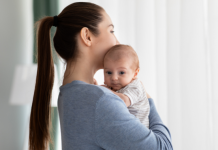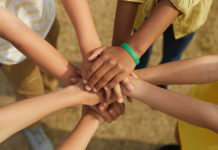 Welcoming baby number two to our family has been an adjustment and no one has felt it more than our 3-year-old. This has manifested in an uptick of tantrums and overall boundary pushing that has culminated in countless power struggles with a 30-year younger version of myself. None of it is out of the ordinary and, in fact, is to be expected, but it does not make it any easier to handle.
Welcoming baby number two to our family has been an adjustment and no one has felt it more than our 3-year-old. This has manifested in an uptick of tantrums and overall boundary pushing that has culminated in countless power struggles with a 30-year younger version of myself. None of it is out of the ordinary and, in fact, is to be expected, but it does not make it any easier to handle.
Recently, one of those difficult moments looked like this: we were at my in-laws for Christmas after what had been a complete nightmare of flying with two littles over the holidays in a snowstorm. Kate was refusing to go upstairs for bedtime and I was forced to carry her up, which began the spiral. She was hitting, spitting, and managed to get a decent bite in on my hip. I was already running on a short fuse from what had been a difficult dinner and the crying, yelling, and hitting was overstimulating.
To say I lost my sh*t feels like an understatement. I snapped, started screaming, and yelled at her to “shut up.”
I instantly froze. I have never spoken to her like that before. Immediately the regret mounted inside me and the shame felt overwhelming – now what?
Why apologies matter
We routinely tell children to apologize, yet as adults, we struggle to do it ourselves. Most of us feel uncomfortable apologizing, especially to our children. But studies show parents who regularly apologize to their children have stronger attachment bonds.
It can be easy to disregard apologizing to a child if we think they are too young to understand. However, kids as young as 3 can grasp the concept. If we want our children to take responsibility for their actions, the best way to teach them is to mirror that behavior. Kids learn from watching how we respond in situations.
Letting our kids know we make mistakes shows them we are not perfect and they don’t have to be either. We all make mistakes and that is ok. It is how we learn, grow, and atone for them that matters.
Apologizing is hard, but it is important to teach kids to sit in the discomfort rather than avoid it. Challenges are a part of life and working through discomfort can help children grow in their emotional intelligence.
Helpful tips
Start by recognizing you are not alone. While emotional and physical abuse are never acceptable, all parents lose their cool at one point or another. We are only human. Give yourself some grace and move forward with the repair. The most important thing is what happens after you snap.
- Make sure you have calmed down and are in a good headspace when apologizing.
- Connect with your child by speaking to them at eye-level. You want your apology to be genuine and unqualified.
- Acknowledge your mistake by describing what you did wrong but avoid making excuses or sharing the blame.
- Avoid things like “I wouldn’t yell if you would just listen,” or “I’m sorry we fought.”
Turn your apology into a dialogue by asking your child how they are feeling. This can help foster a sense of feeling heard and validated. Remember that apologies are meaningless if they become repetitive, so share with your child what you plan to do differently in the future. It can be as simple as, “Next time I will try to slow down and take a deep breath.”
Lastly, ask for forgiveness, but understand they may not be ready. Forgiveness should not be forced and it is important to give your child time (and maybe even space) to get to that point.
We are our children’s greatest role models. They look to us for guidance on how to behave and interact with the world. Admitting our shortcomings and wrongdoing takes courage; so does asking for forgiveness, but doing so will make you a better parent and will help cultivate kindness, empathy, and responsibility in our next generation.
















